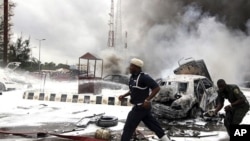Nigerian security forces are cracking down on the militant Islamic group Boko Haram, which claimed responsibility for Thursday's bombing in Abuja. Nigerian authorities and analysts say the extremist group, once confined to the country's northeast, is becoming a nationwide security threat.
The explosion struck the parking lot of a police station in the capital Thursday, killing at least two people and wounding several others. The blast, which is believed to be Nigeria's first suicide bombing, was so powerful it destroyed 30 cars and damaged dozens more.
The attack came less than 24 hours after the Inspector General of Police declared Boko Haram's days were "numbered."
A spokesman for Boko Haram told VOA the bombing marked the collapse of any efforts at dialogue with the government.
Spokesman Usman Alzawahiri says his group is going to attack the entire north and other parts of the country, including the capital, Abuja. He says Boko Haram personnel just returned from Somalia and have been scattered throughout the north. He says security agencies should prepare for intensified attacks, and he advises all Nigerians to be wary.
Visiting the bomb site Sunday, President Goodluck Jonathan called the bombing a terrorist attack that targeted not just the police, but all Nigerians.
Despite Boko Haram's recent claims to ties with violent Islamists in Somalia, security analysts say the group remains a homegrown insurgency with decidedly internal aims, at least for now.
Africa analyst and former U.S. ambassador to Nigeria, John Campbell, said the bombing marked a troubling, though not unexpected, expansion for the group.
"Boko Haram is morphing from being a marginal, very violent, radical Islamic sect into something approaching an insurrection that has some popular acquiescence, if not support," said Campbell. "And what the bombing in Abuja would indicate to me is that it is demonstrating that it can operate outside of the core north."
Boko Haram launched a brief uprising against the government in July 2009, sparking a heavy military response and a week of fighting that killed about 700 people.
Authorities have since blamed the group for a string of bombings and deadly attacks targeting police officers, government officials and religious leaders in Nigeria's north.
The group's name in the Hausa language means, "Western education is a sin." It seeks to undermine state authority and calls for the stricter application of sharia, or Islamic law, in northern Nigeria.
The secretary-general of the Supreme Islamic Council of Nigeria, Lateef Adegbite, said the roots of, what he called, Boko Haram's rebellion against the state lie in economic hardship and unemployment, not religion.
He called for dialogue and the adoption of the "carrot and stick" approach proposed by President Jonathan earlier this month.
"Use carrots to attract them, give them jobs, empower them economically, those who are ready to embrace peace. But those who are not for peace, apply the stick against them," Adegbite said. "Let them be flushed out so that the more moderate ones can take control."
Former ambassador Campbell said Boko Haram is a symptom of not only extreme poverty in the north, but also a sense of alienation from the central government in Abuja.
In this sense, Campbell says parallels can be drawn to the militants in the country's oil-rich Niger Delta who demand a more equal share of the wealth generated the region.
"In the north and in the delta, there is a fundamental sense of grievance against the government in Abuja," he said. "The difference, of course, is that in the delta, so far as I can tell, Jonathan won the elections absolutely hands down, whereas in the north, he did not."
When it comes to Boko Haram, he said, Mr. Jonathan's government needs to build that support in the north and address not only the violence, but also its root causes.




